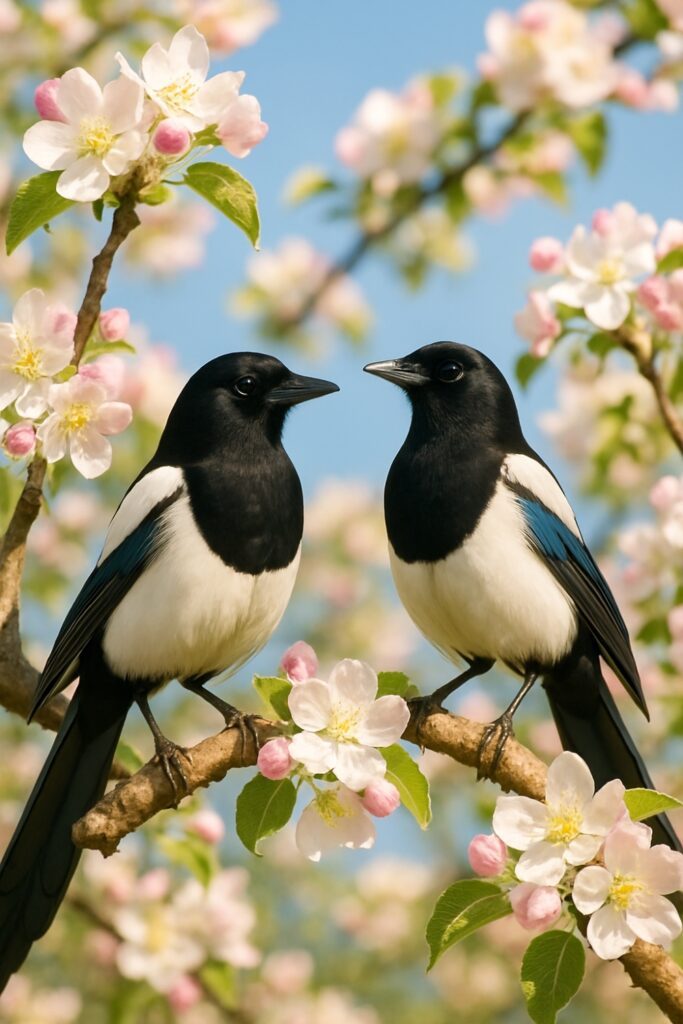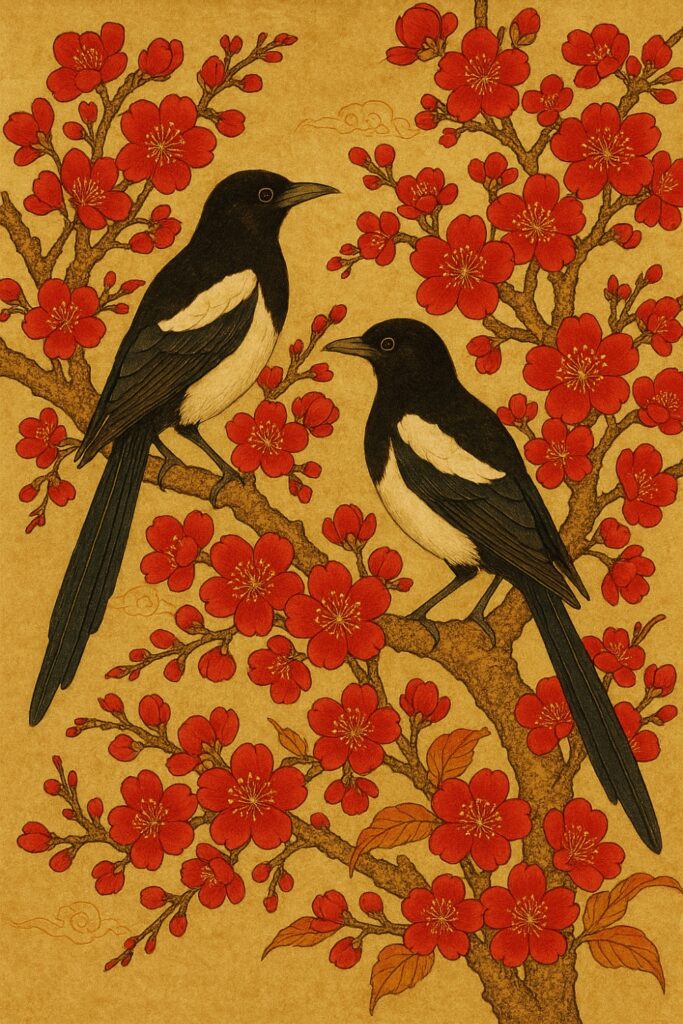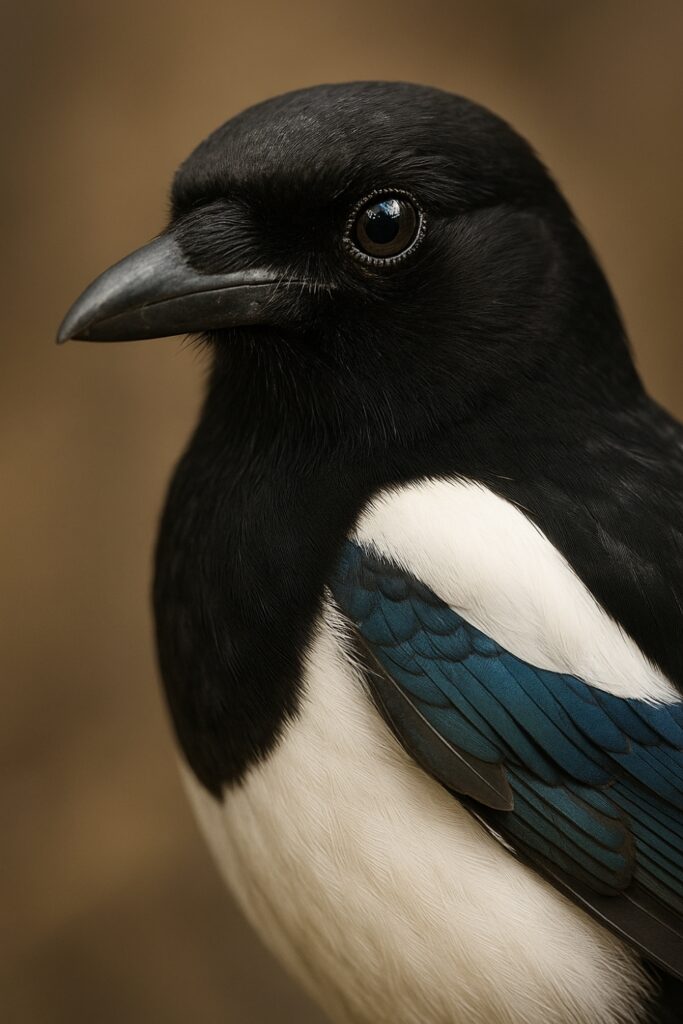Magpies are not inherently bad luck. This belief stems from ancient folklore and Christian traditions that portrayed these intelligent birds negatively. The famous rhyme “One for sorrow, two for joy” reflects old superstitions, but modern science shows magpies are actually remarkably intelligent corvids that play important ecological roles. Whether you see one or several magpies has no bearing on your fortune.
Key Takeaways
- Magpie superstitions originated from medieval Christian beliefs and ancient folklore
- The “One for sorrow” rhyme dates back to at least 1780 in recorded history
- Single magpies are considered unlucky, whilst multiple magpies suggest good fortune
- Corvid intelligence research shows magpies are among the world’s smartest birds
- Cultural differences exist – magpies symbolise good luck in East Asian countries
- Traditional protective rituals include greeting lone magpies politely.
Related Articles
The Origins of Magpie Superstitions
Christian Influence on Magpie Folklore
The negative perception of magpies in European culture largely stems from medieval Christian teachings. According to religious folklore, magpies were the only birds that refused to mourn during Jesus’s crucifixion, allegedly due to their distinctive black and white plumage. This led to the widespread belief that magpies represented vanity and evil.
The Church promoted several myths about these birds, including the notion that magpie tongues contained drops of devil’s blood. Folk belief suggested that cutting a magpie’s tongue would release this evil essence, supposedly granting the bird human speech capabilities.
Ancient Folklore and Cultural Beliefs
Before Christianity’s influence, magpies held different symbolic meanings across various cultures. However, the medieval period saw a dramatic shift in their reputation. The association with death and misfortune became deeply embedded in British and European folklore, particularly regarding corvid family birds.
Weather prediction also played a role in magpie superstitions. Traditional sayings like “A single magpie in spring, foul weather will bring” reflected observations about magpie behaviour during different seasons. Mated pairs typically forage together in good weather, so seeing a lone bird might indicate poor conditions ahead.
The Famous “One for Sorrow” Rhyme

Traditional Versions and Variations
The most enduring magpie rhyme has its earliest recorded version from 1780:
“One for sorrow,
Two for mirth,
Three for a wedding,
Four for death”
The modern version most people know today goes:
“One for sorrow,
Two for joy,
Three for a girl,
Four for a boy,
Five for silver,
Six for gold,
Seven for a secret never to be told”.
Extended Verses and Regional Differences
Some traditional versions include additional lines:
“Eight for a wish,
Nine for a kiss,
Ten a surprise you should be careful not to miss,
Eleven for health,
Twelve for wealth,
Thirteen beware it’s the devil himself”.
These counting rhymes vary significantly across different regions of Britain and Ireland, reflecting local cultural traditions and beliefs about magpie encounters.

Scientific Understanding of Magpie Behaviour
Intelligence and Cognitive Abilities
Modern ornithological research reveals that Eurasian magpies (Pica pica) are extraordinarily intelligent creatures. They belong to the corvid family, which includes some of the world’s smartest birds. Key cognitive abilities include:
- Mirror self-recognition – one of only a few non-mammalian species with this ability
- Tool use and manipulation
- Complex social behaviours and communication
- Problem-solving skills comparable to young children
- Long-term memory and future planning capabilities.
Social Structure and Mating Patterns
Magpie pairs typically mate for life, which explains why seeing a single magpie might seem unusual. These birds demonstrate:
- Cooperative breeding and parental care
- Territorial behaviour during breeding season
- Complex social hierarchies within flocks
- Grief-like responses to deceased companions.
The observation that single magpies appear during harsh weather has a biological basis – one parent often stays with eggs or young whilst the other forages.
Cultural Variations in Magpie Symbolism
Eastern vs Western Perspectives
Whilst Western cultures often view magpies negatively, East Asian traditions present a completely different picture:
Chinese Culture:
- Magpies symbolise happiness and good fortune
- Associated with the Qixi Festival (Chinese Valentine’s Day)
- Featured prominently in traditional art and poetry
- Represent love and partnership.
Korean Culture:
- Magpies are national symbols of good luck
- Associated with family harmony
- Featured on traditional currency and artwork.
Regional British Variations
Even within Britain, regional differences exist in magpie folklore:
Scotland: Single magpies near windows supposedly foretell death Wales: Different counting systems for magpie sightings Ireland: Various protective greetings to ward off bad luck.

Traditional Remedies and Protective Measures
Polite Greetings and Salutations
British folklore provides several methods to counteract potential bad luck from seeing a lone magpie:
Common Greetings:
- “Good morning, Mr Magpie, how is your lady wife today?”
- “Good afternoon, Mr Magpie, how’s your family?”
- Simple hat tipping or saluting gestures.
Physical Actions and Rituals
Traditional protective behaviours include:
- Spitting three times (considered rather rude today)
- Making the sign of the cross
- Winking to pretend you saw two magpies
- Flapping arms to imitate a second bird
- Crossing fingers until another magpie appears.
These rituals reflect the deep-seated psychological comfort people derive from feeling they can influence their fortune.
Modern Scientific Perspective
Debunking Superstitions with Evidence
Contemporary research shows no correlation between magpie sightings and subsequent life events. The confirmation bias that reinforces superstitions occurs when people:
- Remember instances that seem to confirm beliefs
- Ignore contradictory evidence
- Attribute normal life events to supernatural causes
- Seek patterns where none exist.
Ecological Importance of Magpies
Far from being harbingers of doom, magpies play crucial ecological roles:
Environmental Benefits:
- Pest control through insect consumption
- Seed dispersal for plant reproduction
- Carrion cleanup preventing disease spread
- Ecosystem balance as both predator and prey.
Intelligence Research:
- Advancing our understanding of animal cognition
- Contributing to neuroscience research
- Challenging assumptions about non-human intelligence.
Psychological Aspects of Superstition
Why Superstitions Persist
Magpie superstitions endure for several psychological reasons:
Cognitive Factors:
- Pattern recognition tendencies in human brains
- Loss aversion – fear of bad outcomes
- Illusion of control over unpredictable events
- Cultural transmission across generations.
Social Functions:
- Shared cultural identity and traditions
- Conversation starters and social bonding
- Psychological comfort during uncertainty
- Ritual behaviour providing structure
Benefits and Drawbacks
Positive Aspects:
- Cultural heritage preservation
- Nature awareness and observation skills
- Harmless fun and entertainment
- Community connections through shared beliefs.
Potential Negatives:
- Unnecessary anxiety about natural events
- Misunderstanding of wildlife behaviour
- Anthropocentric bias against certain species
- Missed opportunities to appreciate bird intelligence.

Conservation and Coexistence
Supporting Magpie Populations
Instead of fearing these remarkable birds, consider supporting magpie conservation:
Garden-Friendly Practices:
- Provide clean water sources
- Maintain diverse vegetation for insect prey
- Avoid pesticide use that reduces food sources
- Create nesting opportunities with suitable trees.
Respectful Observation:
- Learn about magpie behaviour and seasonal patterns
- Appreciate their problem-solving abilities
- Document interesting behaviours for citizen science
- Share positive experiences with others.
Education and Awareness
Wildlife education can help reduce unfounded fears:
- Understanding corvid intelligence and social structures
- Recognising ecological contributions of native species
- Appreciating cultural diversity in animal symbolism
- Promoting evidence-based rather than superstition-based thinking.
Conclusion
The belief that magpies bring bad luck represents a fascinating intersection of cultural history, religious influence, and human psychology. Whilst these superstitions have deep roots in European folklore, modern scientific understanding reveals magpies as remarkably intelligent and ecologically important birds deserving of our respect and admiration.
Rather than viewing these corvids through the lens of ancient fears, we can appreciate them for their cognitive abilities, complex social behaviours, and vital ecosystem contributions. The next time you encounter a single magpie, consider offering a polite greeting – not from superstition, but from genuine appreciation for one of nature’s most fascinating creatures.
Understanding the origins and persistence of magpie superstitions helps us recognise how cultural beliefs shape our perceptions of wildlife. By embracing scientific knowledge whilst respecting cultural heritage, we can foster better coexistence with the remarkable birds that share our environment.
Whether you choose to follow traditional greetings as a cultural practice or simply observe these intelligent birds with scientific curiosity, remember that your fortune depends far more on your actions and circumstances than on chance encounters with wildlife. Magpies are neither harbingers of doom nor mystical messengers – they’re simply extraordinary birds trying to survive and thrive in our shared world.
Frequently Asked Questions
Q: What does it mean when I see one magpie?
A: Seeing one magpie has no supernatural significance. You might be observing a bird whose mate is nearby but hidden, or one that’s temporarily separated from its partner. Single magpie sightings are perfectly normal wildlife encounters.
Q: How can I attract magpies to my garden?
A: Magpies enjoy gardens with diverse food sources including insects, seeds, and occasionally table scraps. Provide clean water, maintain areas of longer grass for invertebrate populations, and plant native trees for nesting sites.
Q: Are magpies aggressive towards other birds?
A: Magpies can be territorial, especially during breeding season. They may chase away other birds from food sources or nesting areas, but this is natural competitive behaviour rather than inherent aggression.
Q: Do magpies really steal shiny objects?
A: Contrary to popular belief, scientific research shows magpies are actually wary of shiny objects rather than attracted to them. They may investigate unusual items out of natural curiosity, but they don’t typically “steal” for hoarding purposes.
Q: What’s the difference between magpies and other corvids?
A: Magpies are distinguished by their long tails, black and white plumage, and smaller size compared to crows and ravens. They’re part of the corvid family but have unique vocal patterns and social behaviours.
Q: Can magpies recognise individual humans?
A: Yes, magpies have excellent facial recognition abilities and can remember individual humans for years. They may react differently to people based on past positive or negative interactions.
Q: What should I do if I find an injured magpie?
A: Contact your local wildlife rehabilitation centre or veterinary clinic experienced with wild birds. Don’t attempt to treat injuries yourself, as magpies require specialist care and legal considerations may apply.
Q: Are magpie superstitions found in other countries?
A: Magpie folklore varies globally. While European traditions often emphasise bad luck, East Asian cultures view magpies as symbols of good fortune. Australian magpies (different species) have their own cultural associations.
Q: Why do magpies gather in groups sometimes?
A: Magpies may form larger flocks during winter months, at abundant food sources, or during juvenile dispersal periods. These social gatherings serve survival functions rather than supernatural purposes.
Q: Can feeding magpies cause problems?
A: While occasional feeding is generally harmless, regular provision of inappropriate food can cause dependency, nutritional imbalances, and aggressive behaviour. Stick to bird-appropriate foods if you choose to feed them.
